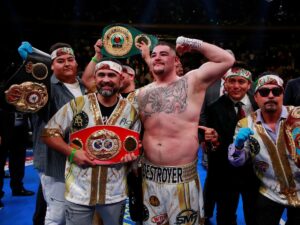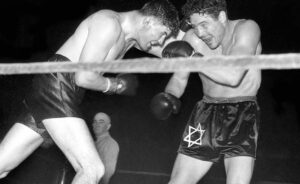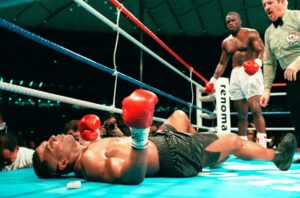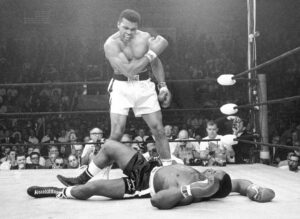Anthony Joshua’s shocking stoppage loss to Andy Ruiz Jr. on Saturday night, losing his WBA, WBO, IBO, and IBF titles and being knocked down four times in the process, is a stark reminder that boxing truly is the theatre of the unexpected. Joshua, the undefeated ‘body-beautiful’, not only looked the part but had proved it in the ring; winning Olympic gold in London 2012; dethroning Charles Martin for the IBF title; getting off the deck to stop the legendary Wladimir Klitschko; unifying titles against Joseph Parker and barely losing a round. Ruiz on the other hand boasted a physique that had provoked comparisons to Butterbean. Despite being well-regarded amongst boxing heads for his speed and skills, he had not faced opposition of Joshua’s calibre; the best name on his resume, the aforementioned Parker, bested him by majority decision for the WBO crown in 2016. Furthermore, Ruiz was a late-notice replacement, stepping in to replace Jarrell Miller after the latter failed a drugs test.

Upsets are nothing new in boxing and heavyweight world title contests are no exception. In this article, we take a look back in boxing history at five other notable occasions on which an underdog shocked their opponent and the boxing world.#5 LISTON-CLAY
No heavyweight resonates in the public mind more than the late Muhammad Ali, a boxer who lived up to his moniker of ‘The Greatest’ in the ring but also transcended his sport to become an icon of social, cultural and political significance, admired and beloved worldwide. It is easy today for us to forget that Ali was a prohibitive underdog when, still bearing his birth name of Cassius Clay, he challenged Sonny Liston for the heavyweight world championship in 1964. The brash, outspoken Clay was seen as being far too inexperienced. More to the point Liston was regarded as being too good and too strong for the young upstart. Armed with a freakishly long reach and chilling knockout power, it had taken him a mere 2 minutes and 6 seconds to vanquish Floyd Patterson to win the title, cementing his reputation as one of the most fearsome heavyweights of all time. In their rematch, Patterson lasted only 4 seconds longer. Clay, meanwhile, was coming off a win against Henry Cooper in which he had needed to pull himself off the deck to win.
The outcome was no less than sensational as Clay defied the odds to batter, bloody and befuddle Liston for six rounds before the champion opted to quit on his stool, claiming a shoulder injury. In reality, he had been utterly outclassed. It was the beginning of the end for Liston, whowould also be stopped in the rematch courtesy of the infamous ‘phantom punch’, and the start of the soon-to-become-Ali’s first reign as heavyweight world champion.

#4 ALI-SPINKS
In 1978, an aging Ali, on his second reign as heavy world champion, defended his title against twenty-four-year-old prospect Leon Spinks. Despite advancing in years, it was felt that Ali would have far too much for Spinks, a 1976 Olympic gold medallist at light heavyweight. In spite of his amateur pedigree, Spinks was the naturally smaller man and a novice in the professional ranks with only seven fights to his name, including a draw against the unheralded Scott Le Doux.
An out-of-shape Ali ended up paying for a lack of preparation as he was thoroughly outhustled and outworked by Spinks who captured the title via a split decision that should really have been unanimous. In the rematch, a much-better-prepared Ali gained revenge in a final career hurrah by schooling Spinks and becoming the first man to win the heavyweight world championship three times.

#3 BAER-BRADDOCKMax Baer was a hard-hitting heavyweight world champion who notoriously once killed a man in the ring. He had stopped a fellow future hall-of-famer, Max Schmeling, en route to violently ripping the title from the giant Primo Carnera, officially knocking him down eleven times during the bout. James Braddock was a one-time journeyman with 25 losses to his name who had been plagued by hand injuries during an up-and-down career in which he had been forced at one point to resort to government welfare to support his family.Braddock was seen as an easy mark for the champion, but produced the performance of his life to shock Baer, taking his best punches along with a well-deserved unanimous decision, stunning the sports writers of the time and earning him the nickname of the ‘Cinderella Man’, later adopted as the title of a 2005 Oscar-winning biographical film starring Russell Crowe as Braddock.

#2 MOORER-FOREMANGeorge Foreman retired from boxing for the first time in 1977, three years after losing the heavyweight world title to Muhammad Ali in the ‘Rumble in the Jungle’. In 1987, he began an improbable comeback, claiming that he wanted to raise funds for his youth centre. A series of knockout victories was parlayed into a 1991 world title challenge against Evander Holyfield. Foreman gave the younger man a terrific contest, but fell to a clear defeat nonetheless. Two years later, another wide defeat on points, to Tommy Morrison for the WBO belt, left people questioning his place in the sport. The following year however, Foreman, now 45 years of age, received another chance against Michael Moorer. Moorer, a former light heavyweight world champion who had carried his power up to heavyweight, was young enough to be Foreman’s son and was coming off an upset win against Holyfield for the WBA, IBF and lineal titles.For nine rounds, Moorer mercilessly pounded Foreman, making him look every bit his age. Then in the tenth round, Foreman landed a short right hand for the ages. It detonated on the chin of Moorer, sending him to the canvas and unable to beat the count. With a single punch, Foreman had regained the heavyweight title twenty years after losing it in Zaire, becoming the oldest man to win the title and demonstrating that the last thing to leave a great fighter really is his power.

#1 TYSON-DOUGLAS
In 1990, Mike Tyson reigned supreme atop the heavyweight tree and Tyson-mania in the media was at its peak. The self-styled ‘baddest man on the planet’ had become the youngest heavyweight champion in boxing history in 1986 when he wrecked Trevor Berbick in two rounds and had swatted aside all challengers with shocking ease, including a 91-second demolition of Michael Spinks for the lineal championship in 1988. Cracks were starting to appear in his personal life, with his marriage to Robin Givens on the rocks and recent splits with his manager and long-time trainer, but the consensus was that he would too much, far too much, for his challenger Buster Douglas. Douglas had been knocked out twice previously, once by former Tyson victim Tony Tucker, and had a reputation for running out of gas late in fights. Within the boxing world, not one person gave him a chance against a rampaging Tyson. Only one casino was prepared to put odds on the fight – 42 to 1 for Douglas the underdog – and it was felt that this was more of a gimmick than anything else.
Just weeks before the fight, events outside the ring served to galvanise Douglas. His mother passed away and a devastated challenger trained with never-before-seen rigour, determined to win the heavyweight title in her memory. On 11thFebruary 1990, he entered the ring in Tokyo, Japan in the best shape of his life, motivated and focussed. The writing was on the wall from the start. Douglas showed no fear as he exploited an out-of-sorts Tyson’s lack of timing and rhythm, consistently beating him to the punch early on. By the middle rounds, Tyson’s left eye was swelling badly and Douglas was continuing to punish him with clean, effective punches. In the eighth round, Tyson had his moment. Having been backed up to the ropes, he landed a flush uppercut that sent Douglas crashing to the canvas. Douglas hit the canvas in anger at his lapse and rose before the count of ten, with a timely bell sounding the end of round. A fading Tyson had nothing left and two rounds later found himself on the canvas courtesy of Douglas’ own devastating uppercut, unable to beat the referee’s count, giving Douglas the victory of a lifetime and undoubtedly the biggest upset in the history of heavyweight world title fights.
Article by: Paul Lam
Follow Paul on Twitter at: @PaulTheWallLam
 #5 LISTON-CLAY
#5 LISTON-CLAY